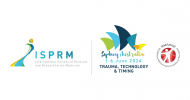Session outline
Communication ability is fundamental to everyday functioning, and vital to engaging with healthcare services. Over 250,000 Australians live with communication disabilities resulting from stroke and traumatic brain injury, compromising every aspect of daily life, and significantly impacting mental health, employment, social participation, and family functioning. Rehabilitation services do not currently meet the specialised needs of this group with this inequity leading to poorer and more costly healthcare outcomes.
Technology is fast becoming a standard component of rehabilitation and management of communication disability, both as a tool to enhance therapy and a target of intervention10. This workshop explores cutting-edge technology categories and their applications to communication disability after stroke or brain injury. Participants will gain insights into available and emerging approaches across artificial intelligence, virtual reality, self-management tools and telehealth.
Learning outcomes
Workshop objectives:
- Artificial Intelligence (AI): Understand the history and potential of AI in diagnosing and personalising treatment strategies for individuals with neurological communication disabilities. Current uses of generative AI will be demonstrated.
- Virtual Reality (VR): Explore both immersive and non-immersive VR in communication rehabilitation, its benefits in simulating real-world scenarios, and its impact on cognitive and communicative recovery.
- Self-Management Tools: Discover digital platforms that empower patients to self-manage recovery and rehabilitation, fostering independence and improving outcomes. Discover tools to support health care professionals to manage healthcare communication more effectively.
- Telehealth: Learn about the advancements in remote healthcare, its significance in reaching underserved populations, and its effectiveness in delivering consistent and quality care.
Target audience
- Allied health
- Medical practitioners
- Students
- Trainees
- Nursing staff



